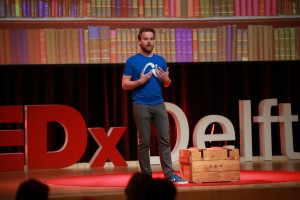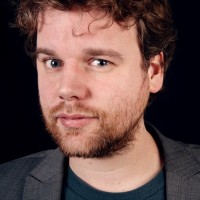 “Books transport you to places you have never been and can transport you into another person’s head. These experiences were so great, I wanted to become a writer,” said Niels ‘t Hooft. “However, we don’t have the time to read as much as we want to anymore.” He carried a chest full of abandoned reading material on stage with him, expressing his worry about the future of the novel.
“Books transport you to places you have never been and can transport you into another person’s head. These experiences were so great, I wanted to become a writer,” said Niels ‘t Hooft. “However, we don’t have the time to read as much as we want to anymore.” He carried a chest full of abandoned reading material on stage with him, expressing his worry about the future of the novel.
‘t Hooft is a journalist and fiction writer, who started out his career building a website about video games. A published author of three novels and a number of short stories, his love for technology has never left him. He calls himself a ‘hybrid author’, and combines his love for both writing and technology by working on story development and direction, and the creation of fantasy worlds in which games are set.
He believes that more than time constraints, the smartphone is the main reason we are not reading novels anymore. But could it be the solution too? “A smartphone can store thousands of books, and we read on it already,” said ‘t Hooft. He shared three suggestions to integrate novels and smartphones. The first is an alternative interface which shows just one piece of text at a time, what he called “a hybrid between the dynamism of scrolling and the staticism of paper.” The second is making better use of the stereo sound and color screen, to give the reader pointers as to where he is in the setting of the story, for example. The third is an app to track the way people are reading his novels, creating two-way communication with his audience.
“I want to help to make literature more relevant in this digital age,” said ‘t Hooft. “Not waiting for the future to happen, but help shape it. Creating an experience for other people that is unique to me.” Perhaps that is too grand a goal, so for now, he advised the audience to: “Find a quiet place, shut down all your devices and read a novel.”

